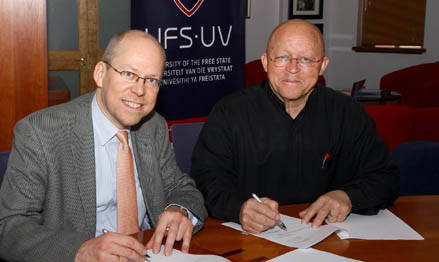Latest News Archive
Please select Category, Year, and then Month to display items
23 April 2020
|
Story Cornelius Hagenmeier
|
Photo Pixabay

The iKudu project, which is an European Union-funded Capacity Building in Higher Education (CBHE) project, has recently launched its blog, which aims to amplify the diverse voices of all iKudu stakeholders. In this space, members of the iKudu team will regularly share their views on the project and related international education topics.
The iKudu project focuses on developing a contextualised South African concept of Internationalisation of the Curriculum (IoC), which integrates Cooperative Online International Learning (COIL) virtual exchanges. The project was launched by the UFS in 2019, together with nine European and South African partner universities. It is funded by the European Union’s Erasmus+ programme with EUR999 881 (approximately R20 million) and is implemented over a three-year period.
The iKudu project is based on the fundamental belief that it is necessary to rethink internationalisation in an uncertain world. First, it is crucial to recognise and transform the power dynamics underlying international academic collaboration. Second, it is essential to develop pedagogies that allow every student to participate in international education, integrating technology where appropriate.
However, while all stakeholders agree on the fundamental tenets of the project and its principal goals, all iKudu stakeholders contribute different perspectives. In the blog, the iKudu stakeholders will provide a space for intellectual discourse on the project and related international education topics, which will allow constructive and critical engagement.
The link to the blog can be found at: https://www.ufs.ac.za/ikudu/ikudu-blogs/Transforming-Curricula-through-Internationalisation-and-Virtual-Exchanges
Strengthening ties with Belgium ally
2013-10-31
|
 |
From the left are: Prof Dr Johan Meeusen signing the agreement with Prof Nicky Morgan, Vice-Rector: Operations.
Photo: Hannes Pieterse
31 October 2013 |
The UFS signed a formal agreement with the University of Antwerp, strengthening the two institutions’ existing collaboration. Prof Dr Johan Meeusen, Vice-Rector and Professor of European Law and Private International Law at the University of Antwerp, visited the Bloemfontein Campus to sign the agreement. This arrangement will ensure that the two institutions work in close conjunction on research and additional projects.
Dineo Gaofhiwe-Ingram, Assistant Director: Internationalisation, says the new relationship between the two universities will have a strong research focus. "It’s evident and known that we want to become a research-intensive university.” She emphasises that the relationship with Antwerp as well as partnerships with a variety of other institutions are crucial. These will ensure that young emerging scholars, like those taking part in the Vice-Chancellor's Prestige Scholars Programme, are exposed internationally during their development. “We hope that some of the scholars in the new cohort of the PSP will be able to find scientists to host them at Antwerp," Gaofhiwe-Ingram adds.
In addition, she explains that this formal agreement will augment pre-existing collaborations with the Unit for Language Facilitation and Empowerment, as well as the Centre for Health Systems Research and Development. It will also open up cooperation between other faculties and disciplines. “Through Eurosa/Erasmus Mundus Project, which awards scholarships to South African students and staff to study in Europe, the 2014 project will now also award scholarships to European students and staff to come and study in South Africa,” Gaofhiwe-Ingram announced.
The University of Antwerp is one of the European associates that participates in the Leadership for Change Programme and hosted a group of first-year Kovsie students during 2011. In 2012, representatives from the University of Antwerp attended the Leadership Summit presented on the Bloemfontein Campus. Another group of first-year students from the UFS took part in this year’s programme.